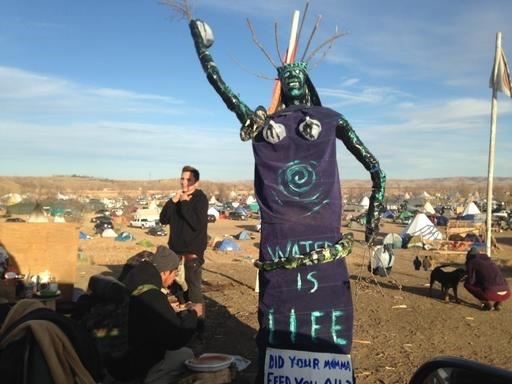 |
| A sculpture stands at an encampment where protesters of the Dakota Access oil pipeline have been gathered for months, Saturday, Nov. 26, 2016, near Cannon Ball, N.D. Protest organizers said that they have a right to stay on the land. Their statement comes a day after the U.S. Army Corps of Engineers told they would have to leave by Dec. 5. (AP Photos/James MacPherson) |
CANNON BALL, N.D. (AP) — Dakota Access oil pipeline protesters will not follow a government directive to leave the federal land where hundreds have camped for months, organizers said Saturday, despite state officials encouraging them to do so.
Standing Rock Sioux tribal leader Dave Archambault and other protest organizers confidently explained that they'll stay at the Oceti Sakowin camp and continue with nonviolent protests a day after Archambault received a letter from the U.S. Army Corps of Engineers that said all federal lands north of the Cannonball River will be closed to public access Dec. 5 for "safety concerns."
The Corps cited the oncoming winter and increasingly contentious clashes between protesters, who believe the pipeline could harm drinking water and Native American cultural sites, and police.
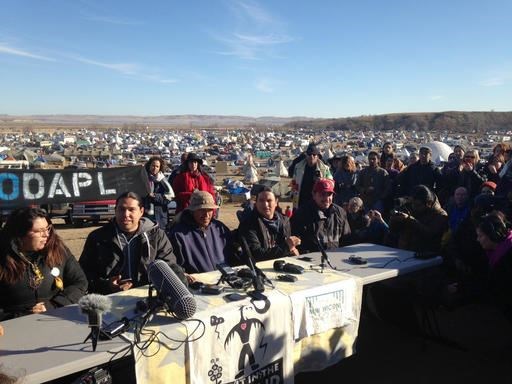 |
| Organizers of protests against construction of the Dakota Access oil pipeline speak at a news conference on Saturday, Nov. 26, 2016, near Cannon Ball, N.D. They said they have a right to remain on land where they have been camped for months. They made the statement a day after tribal leaders received a letter from the U.S. Army Corps of Engineers, telling them the land would be closed to the public on Dec. 5. (AP Photo/James MacPherson) |
Standing Rock tribal members believe the land in which the encampment is on is owned by the Sioux through a more than century-old treaty with the U.S. government.
"We are wardens of this land. This is our land and they can't remove us," said protester Isaac Weston, who is an Oglala Sioux member from South Dakota. "We have every right to be here to protect our land and to protect our water."
The vast majority of the several hundred people fighting against the four-state, $3.8 billion pipeline have created a self-sustaining community at the sprawling camp, which is on Corps land in southern North Dakota, and have put up semi-permanent structures or brought motor homes and trailers in advance of the harsh winter.
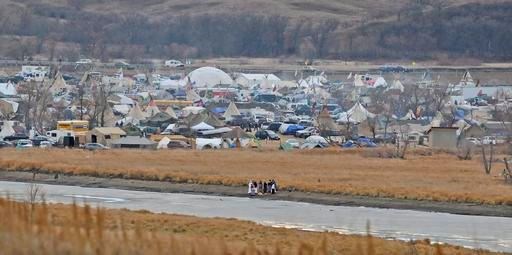 |
| In this Nov. 24, 2016 photo, people stand on the edge of Cantapeta Creek near the growing Sacred Stones Overflow Protest Camp in Morton County, N.D. The leader of the Cheyenne River Sioux in South Dakota is calling for all opponents of the Dakota Access oil pipeline to boycott businesses in North Dakota's capital city. (Tom Stromme/Bismarck Tribune via AP) |
On the unseasonably warm Saturday, people were chopping wood and setting up tents at the encampment, which is more than a mile from a Missouri River reservoir where the final large segment of the pipeline is yet to be completed due to the Corps consulting with the tribe. Authorities had set up a staging area about a mile away on a hill overlooking the site.
Dallas Goldtooth, a protest organizer with the Indigenous Environmental Network, said it is "an atrocious example that colonization has not ended for us here as indigenous people," and that the government's request will escalate already rocky tensions.
Representatives from the Army Corps of Engineers didn't immediately return multiple messages Friday or Saturday seeking comment and verification of the letter. Last month, the Corps said it would not evict the encampment, which started as overflow from smaller private and permitted protest sites nearby and began growing in August.
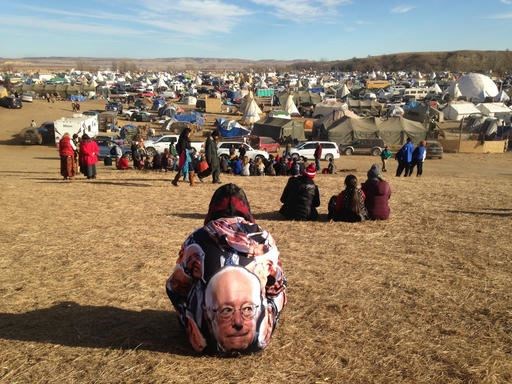 |
| Protesters gather at an encampment on Saturday, Nov. 26, 2016, a day after tribal leaders received a letter from the U.S. Army Corps of Engineers that told them the federal land would be closed to the public on Dec. 5, near Cannon Ball, N.D. The protesters said Saturday that they do not plan to leave and will continue to oppose construction of the Dakota Access oil pipeline. (AP photo/James MacPherson) |
President Barack Obama raised the possibility of rerouting the pipeline in that area earlier this month, something Kelcy Warren, CEO of Texas-based pipeline developer Energy Transfer Partners, told The Associated Press is not an option from the company's standpoint. Obama said his administration is monitoring the "challenging situation" but would "let it play out for several more weeks."
Some of the protests have resulted in violent confrontations — one woman suffered a serious arm injury last weekend — and more than 500 people have been arrested since August.
The Corps' letter, according to Archambault, said that those who stay on the land after Dec. 5 may be prosecuted, and that there'll be a free speech zone south of the river.
Archambault said Saturday that he doesn't believe the Corps will forcibly evict people from the camp, adding that the tribe is working to provide protesters protection from the elements on its reservation, which is south of the Cannonball River, but offered few details.
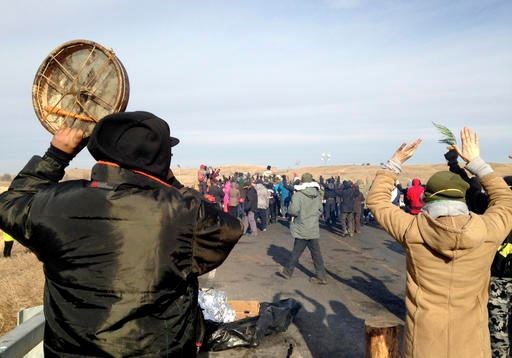 |
| Protesters against the Dakota Access oil pipeline congregate Monday, Nov. 21, 2016, near Cannon Ball, N.D., on a long-closed bridge on a state highway near their camp in southern North Dakota. The bridge was the site of the latest skirmish between protesters and law officers, in which officers used tear gas, rubber bullets and pepper spray, and authorities say protesters assaulted officers with rocks and burning logs. (AP Photo/James MacPherson) |
It's the federal government's job to peacefully close the camp because it allowed people to stay there in the first place, Gov. Jack Dalrymple said in a statement Saturday.
"Our state and local law enforcement agencies continue to do all they can to keep private property and public infrastructure free from unpermitted protest activities, and its past time that the federal government provides the law enforcement resources ... to enforce their own order to vacate," the Republican said.
That sentiment was echoed by Morton County Commission chairman Cody Schulz, who said county and state leaders have been seeking federal law enforcement help for months. "It's now time for the federal government to live up to its obligations" said Schulz.
Republican U.S. Sen. John Hoeven and Democratic U.S. Sen. Heidi Heitkamp said the protesters need to move for public safety.
"The well-being and property of ranchers, farmers and everyone else living in the region should not be threatened by protesters who are willing to commit acts of violence," Hoeven said in a statement Friday. He also called on the Obama administration to let work on the pipeline move forward, saying, "this difficult situation has gone on too long and we need to get it resolved."
Heitkamp said the Corps' order is "a needed step to support the safety of residents, workers, protesters and law enforcement."
Copyright 2016 The Associated Press. All rights reserved.
This material may not be published, broadcast, rewritten or redistributed.
Page created on 11/29/2016 1:31:06 PM
Last edited 11/29/2016 1:31:06 PM





